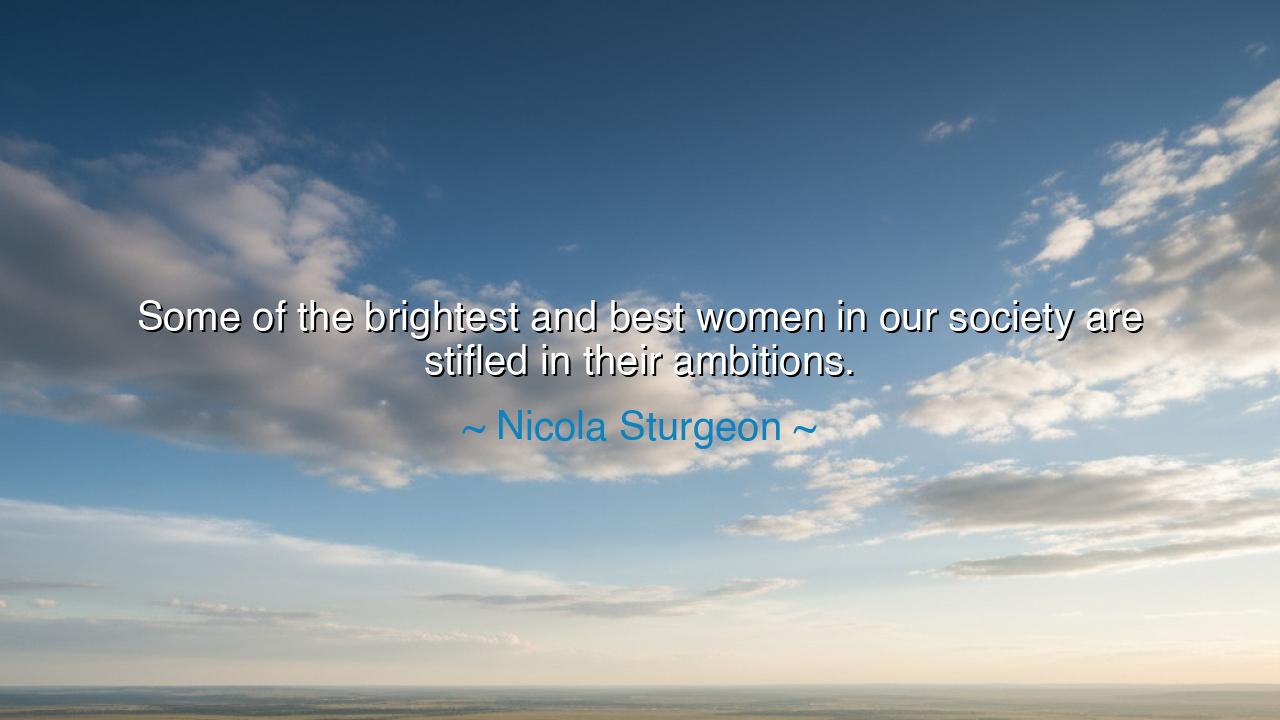
Some of the brightest and best women in our society are stifled






Hear the lament of Nicola Sturgeon, spoken with clarity and sorrow: “Some of the brightest and best women in our society are stifled in their ambitions.” These words are both a cry of grief and a call to arms. They tell us that though talent, brilliance, and vision are given freely by nature, they are too often chained by the hands of custom, prejudice, and injustice. In these words lies the recognition that society has silenced voices that could have transformed it, dimmed lights that could have guided it, and restrained dreams that could have elevated it. To stifle the ambition of a woman is to rob the whole of society of her gift.
The origin of this thought lies in Sturgeon’s life as a political leader and the first woman to serve as First Minister of Scotland. She has walked in halls of power where women were few, and she has seen firsthand the barriers that remain invisible to those who do not face them. Her words are not abstract—they rise from observing how even the most capable women are pushed aside, doubted, or diminished, not because they lack skill or brilliance, but because the world has yet to fully welcome their presence in places of influence.
The ancients, too, bore witness to this injustice. Consider the story of Aspasia of Miletus, companion of Pericles in Athens. Though she was famed for her wisdom and eloquence, influencing the greatest statesman of her age, she could never herself stand in the assembly, for women were forbidden to speak in public affairs. Her brilliance shone, but only through borrowed voices. Had Athens freed her ambition, perhaps its golden age might have been brighter still. So too do Sturgeon’s words remind us: when women are stifled, society denies itself the fullness of its own potential.
History gives us another tale in the life of Marie Curie, the scientist who won two Nobel Prizes in physics and chemistry. Even she, whose genius reshaped the understanding of matter, was resisted and distrusted because of her sex. Universities once barred her, critics dismissed her, and doors closed against her. Yet she persevered, and the world reaped the harvest of her discoveries. But how many others of her time—women as bright and devoted—were not allowed to persevere? Their names are lost, their contributions unwritten, their ambitions stifled.
The meaning of Sturgeon’s words is thus unveiled: the brightest and best women exist in every age, but too often their paths are blocked by structures that do not see them as equal. This is not only a personal tragedy—it is a collective loss. Every ambition crushed is an invention never made, a book never written, a nation never led. A society that stifles women’s ambition is like a tree cutting off its strongest branches, leaving itself weaker, smaller, and poorer.
What lesson shall we, who inherit these words, take for ourselves? That ambition in women must not be feared, but nourished. That the barriers of prejudice must be named and dismantled. That workplaces, schools, and governments must not only allow women to rise but must support them to do so. And we, as individuals, must examine our own habits of thought and speech, ensuring that we do not, knowingly or unknowingly, add to the weight that holds them down.
Therefore, children of the future, inscribe this wisdom upon your hearts: when women’s ambitions are stifled, the whole of humanity suffers; when they are freed, the whole of humanity soars. Encourage the voices that tremble with new ideas. Support the leaders who dare to stand where others say they do not belong. Teach your daughters that their dreams are sacred, and teach your sons that their sisters are their equals. For in doing so, you will weave a society that is just, radiant, and whole—where no ambition is stifled, and every brilliance is allowed to shine.






AAdministratorAdministrator
Welcome, honored guests. Please leave a comment, we will respond soon